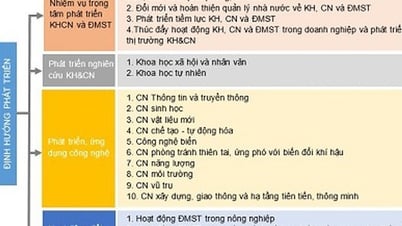Officially effective from September 1, 2023, Circular No. 06/2023/TT-NHNN (dated June 28, 2023) of the State Bank has attracted public attention, helping to unclog credit flows.
 |
| Customers transact at Tien Phong Commercial Joint Stock Bank. Photo: Nguyen Quang |
Officially effective from September 1, 2023, Circular No. 06/2023/TT-NHNN (dated June 28, 2023) of the State Bank amending and supplementing a number of articles of Circular No. 39/2016/TT-NHNN regulating lending activities of credit institutions and foreign bank branches to customers, attracted public attention when many points considered disadvantageous to businesses were amended.
According to experts, Circular No. 06/2023/TT-NHNN helps perfect the legal framework for lending, unblock credit flows, and direct capital flows to safe and effective projects.
Many notable new points
New points in Circular No. 06/2023/TT-NHNN are assessed to create more favorable conditions for people and businesses to access bank credit capital to serve production, business and consumption activities.
Typically, regulations on lending activities by electronic means both facilitate credit activities and are consistent with the digital transformation orientation of the banking industry. Credit institutions are encouraged to apply digital technology to credit activities, contributing to simplifying processes and procedures.
Customers do not have to go to transaction points but operate on electronic devices, saving time and costs. Customer information is verified electronically (eKYC); loan agreements are concluded in the form of electronic contracts; loan documents are established in the form of electronic data, stored in the digital environment...
To control the source of identification data, customers are authenticated by the national database of population, citizen identification or electronic authentication of the service provider according to the provisions of law. The source of identification data in eKYC activities is interconnected between banks, is official and reliable, ensuring safe, healthy eKYC activities, and timely prevention of fraud risks.
Another notable new point is that for loans to serve essential consumer needs and personal and household consumption purposes (for example, loans to buy cars, buy consumer equipment, etc.), there is no need for a plan or project.
Customers only need information about the loan amount, loan purpose, loan duration and proof of the source of funds to repay the debt. For loans to buy houses; build, renovate houses or receive transfer of land use rights to build houses of great value, customers need to add plans and projects in the loan application to have full information about the loan purpose, as well as prove the use of the loan for the right purpose.
In addition, Circular No. 06/2023/TT-NHNN supplements the regulation that credit institutions are allowed to consider and decide to allow customers to repay loans at other credit institutions for the purpose of borrowing to serve their living needs. This regulation creates conditions for customers to access more bank credit sources and have the opportunity to choose better services and utilities at credit institutions.
According to representatives of commercial banks, with this regulation, even if customers already have a home loan at bank A, if they see that bank B has a lower interest rate and enjoys some other preferential services, they can go to bank B to propose a loan to repay the loan at bank A early.
 |
| Circular No. 06/2023/TT-NHNN will facilitate businesses to access credit capital to serve production and business activities. In the photo: Manufacturing steel products at Minh Cuong Mechanical - Construction - Trading Joint Stock Company. |
Create initiative for credit institutions
From a customer's perspective, Ms. Bui Thi Binh (Udic apartment building, Vo Chi Cong street, Tay Ho district) said that the notable point is the loosening of lending conditions.
Under previous regulations, borrowers must ensure minimum conditions, such as: Using loan capital for the right purpose, having a feasible plan, having the financial capacity to repay the debt...; under the new regulations, loan security measures are agreed upon by the credit institution and the customer. This creates favorable conditions for banks to be proactive in the process of granting credit and managing loans.
In fact, in recent times, credit institutions have implemented many measures to secure loans, such as: Mortgaging assets, circulating goods, debt collection rights... or lending without collateral based on customer assessment of effective production and business plans and projects, with financial capacity to repay loans in full and on time, both principal and interest.
Commercial bank representatives explained that, with the new regulation, loan guarantee is only one of the important conditions but not a mandatory condition in loan repayment.
According to statistics from the State Bank, as of the end of July 2023, credit increased by only 4.56% compared to the beginning of 2023, down 0.17% compared to the end of June 2023. Banks are also businesses, so they have the right to decide which projects to lend to and which not to lend to according to their own views.
The “open” regulations in Circular No. 06/2023/TT-NHNN create a legal corridor and favorable conditions for banks to disburse credit capital, promote growth, and ensure major balances of the economy . People and businesses will also have easier access to bank capital for production, business and consumption activities.
Source





































































































Comment (0)